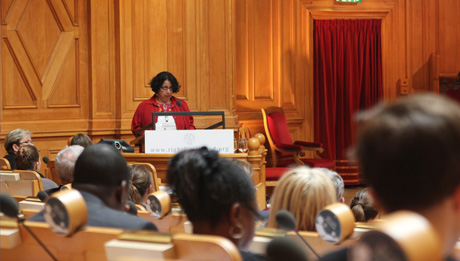“The Right Livelihood College aims to be five things – a hub, a catalyst, an incubator, a multiplier and an accelerator of links between universities and the work of Right Livelihood Laureates, an interactive link between academics and activists.”
Anwar Fazal – Right Livelihood Award Laureate 1982
The Right Livelihood College (RLC) is a global capacity building initiative of the Right Livelihood Award Foundation. Founded in 2009, the RLC aims to make the knowledge of the Laureates accessible to all and, by linking young scholars, academics and civil society organisations with the Laureates, hopes to make their “winning ideas” succeed and multiply.
- Goals
The RLC has four main goals:
1. Making the knowledge of Laureates accessible to all, the general public as well as individuals and academics with the potential to make the ‘winning ideas’ of Laureates succeed and multiply.
2. Actively linking the most excellent educational institutions with the Laureates, thus providing researchers and students unparalleled access to primary data and case studies of eminent civil society activists and movements.
3. Connecting the global community of Laureates to help releasesynergies, scale tested know-how and create the critical mass to help bring their common goals forward.
4. Providing a hub and an incubator for promoting and multiplying the most successful solutions to urgent global problems through the development of information and education activities including web-based learning materials, meetings, networking and internship and research scholarship programmes.
Activities
Every Right Livelihood Laureate is automatically a Fellow of the Right Livelihood College. The role of the Fellow is to be the principal source of supply of learning resources through engagement in activities of education, scientific research, and practical activities that share and upscale their work.

- From left to right: Wes Jackson (RLA 2000), Prof. Dr. Solvay Gerke (Director ZEF), Shrikrishna Upadhyay (RLA 2010), H.R. Sudarshan (RLA 1994), Monika Griefahn (Co-Chair Board of Trustees) and Raúl Montenegro (RLA 2004) at RLC Bonn Seminar ‘Reverse Degradation’, May 2011. Credit: ZEF Bonn
The following are some of the generic activities which the College carries out in collaboration with other partner organizations:
- Laureates will share their ‘winning ideas’ with university staff and students by giving lectures on particular issues; some forty lectures have taken place since the founding of the College.
- Fellowships and research grants are given to outstanding students and researchers to further work on issues Laureates are working on; some ten fellowships have been awarded.
- Between two and five interns are supported and mentored by the Laureates on specific issues; over a dozen internships have taken place.
- Various international policy and action building courses and seminarsare promoted, building upon the knowledge and activities of the Laureates. Topics that have been covered include ‘social mobilization’, ‘reversing environmental degradation’ and ‘how to make a better world’. Over a dozen courses and seminars have been organised.
- The College is planning to publish a scientific monograph series and easy-to-understand publications in public booklet series. Both these type of publications will help explain Laureate key issues, actions and resource links. The College is currently seeking partners to help set up this venture.
- Inspiring films will be produced with the aim to multiply the thoughts and actions of the Laureates. The Right Livelihood Youtube channel contains short documentaries on Laureates in English, German, French and Spanish.
- ‘Days of Action’ are organised to link selected international United Nations days with issues Laureates are working on, such as biodiversity, water and migrant workers. An active programme on volunteerism – Lifting Others Through Voluntary Engagement (LOVE) – and a Run for Peace are organised on a regular basis.
- Upscaling: The College works closely with the Laureates in identifying appropriate institutions that can be partners with the College and the Laureates. It is planned to develop such partnerships in other countries with at least one major link in each continent. Thus far, the College has established additional campuses at Universiti Sains Malaysia (Malaysia, 2009-2014), Lund University (Sweden), Addis Ababa University (Ethiopia), University of Port Harcourt (Nigeria), Universidad Austral de Chile (Chile), University of California Santa Cruz (USA), University of Bonn (Germany) and Tata Institute of Social Sciences (India). Currently, discussions are under way for establishing partnerships in the Pacific.
Main photo: Camila Montecinos representing GRAIN International (RLA 2011) at the RLC Seminar ‘Landgrab’ in the Swedish Parliament, Stockholm, May 2012.










